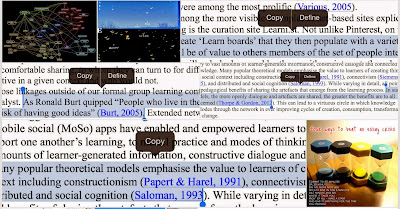All to change in education
Total mayhem all around at this end.
The PGCE I am doing, onto Module 3, was a must have to balance against the Masters in Education I did 7 years ago. I need the front line practice and experience I do not feel I get as a learning technologist. It makes the academic theory more relevant. I see myself as a Learning Designer in future and will teach both online and in the class.
Due to a Covid-19 scare I have 'volunteered' to run five 90 minute online workshops on Screencastify using Google Meet. I've done one session which was a scary experience. It can only get easier ... or not. Some will have poor online access, or try to listen in from their phone sitting in their Dad's car - the only place they can work undisturbed. Others for lack of device or internet will have to come into college ... or not. Some want to learn and race ahead. Some have little desire to learn and do little or less. As long as they are not disruptive what can I do?
I have just completed 'Take Your Teaching Online' a free course with the Open University > https://bit.ly/39LI4Vw
If you want to understand the design and delivery of online learning this is the best that there is for now. It could be shorter. Some of the content is a bit dated or no longer relevant. The multiple choice formative quizzes are flawed. The formal assessments are a worthy challenge.
I see education going the way of retail.
The 'disruption' brought on by Amazon has been 20 years in the making. Exactly 20 years ago, or perhaps 19, I recall being overly generous with my credit card and buying books from Amazon for every family member I expected to see that Christmas at two annual gatherings split between my family (4 children, mother and stepfather, stepbrother and between 6 and 8 children) and my wife’s smaller family (3 children, mum and dad and 3 children). The disruption on the high street was a slow burn; Covid-19 kicked everything online.
In 10 years, or sooner, the education landscape will look as different and will have experienced as much disruption. Far more people will learn at a pace suited to their desire to learn and abilities. Or their parents’ desire for their children to learn and the depths of their pockets. All private education costs. And you get what you pay for. Why not home educate as the aristocracy and landed gentry of 120+ years ago did? Being a virtual tutor could be a new job description where teaching online as an educator you tutor enough students privately one to one (rarely face to face) to make a good living.
The brightest will start university courses at 14 or 15; that is already happening.
Everyone needs to become a 'lifelong learner' just to stay abreast of the changes.
It’s a phrase I used a decade ago ‘learning at the speed of desire’. Just Google it, then get on with it. What’s the fuss? Tell me what you cannot learn online if you set your mind to the task??
EdTech 2020 said the other week to expect educational institutions, FE and HE, rather than primary and secondary (I think) moving to a model of 25 to 100 online. Some colleges will close and operate like the Open University. They will deliver it all online … albeit with a twice monthly tutorial day and possibly the acclaimed Open University residential courses.
Meanwhile if Climate Change causes major 'weather events' every ten years rather than every 50 or 60, I am equally worried, for the same reasons - population pressure, that pandemics like Covid-19 will also come every 20 years or so rather than every 100. We will see.
All doom and gloom? Not for me, I thrive on change.




